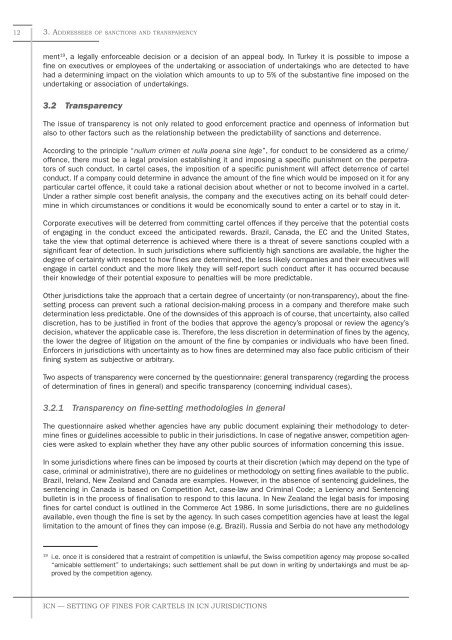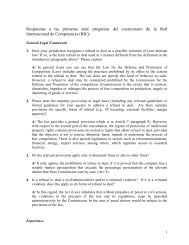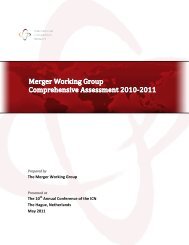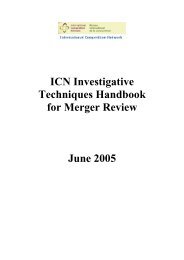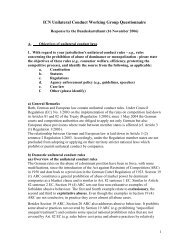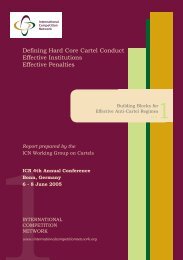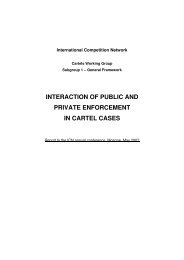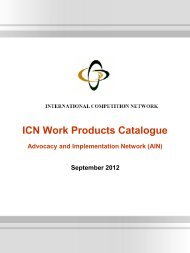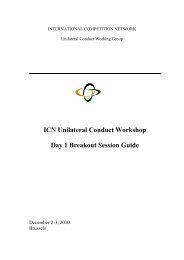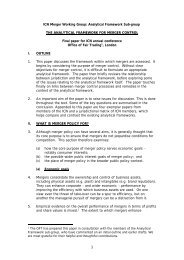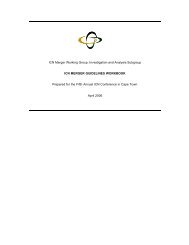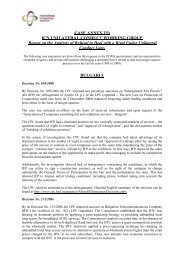Setting of Fines for Cartels in ICN Jurisdictions - International ...
Setting of Fines for Cartels in ICN Jurisdictions - International ...
Setting of Fines for Cartels in ICN Jurisdictions - International ...
You also want an ePaper? Increase the reach of your titles
YUMPU automatically turns print PDFs into web optimized ePapers that Google loves.
12 3. ADDRESSEES OF SANCTIONS AND TRANSPARENCY<br />
ment 19 , a legally en<strong>for</strong>ceable decision or a decision <strong>of</strong> an appeal body. In Turkey it is possible to impose a<br />
f<strong>in</strong>e on executives or employees <strong>of</strong> the undertak<strong>in</strong>g or association <strong>of</strong> undertak<strong>in</strong>gs who are detected to have<br />
had a determ<strong>in</strong><strong>in</strong>g impact on the violation which amounts to up to 5% <strong>of</strong> the substantive f<strong>in</strong>e imposed on the<br />
undertak<strong>in</strong>g or association <strong>of</strong> undertak<strong>in</strong>gs.<br />
3.2 Transparency<br />
The issue <strong>of</strong> transparency is not only related to good en<strong>for</strong>cement practice and openness <strong>of</strong> <strong>in</strong><strong>for</strong>mation but<br />
also to other factors such as the relationship between the predictability <strong>of</strong> sanctions and deterrence.<br />
Accord<strong>in</strong>g to the pr<strong>in</strong>ciple “nullum crimen et nulla poena s<strong>in</strong>e lege”, <strong>for</strong> conduct to be considered as a crime/<br />
<strong>of</strong>fence, there must be a legal provision establish<strong>in</strong>g it and impos<strong>in</strong>g a specific punishment on the perpetrators<br />
<strong>of</strong> such conduct. In cartel cases, the imposition <strong>of</strong> a specific punishment will affect deterrence <strong>of</strong> cartel<br />
conduct. If a company could determ<strong>in</strong>e <strong>in</strong> advance the amount <strong>of</strong> the f<strong>in</strong>e which would be imposed on it <strong>for</strong> any<br />
particular cartel <strong>of</strong>fence, it could take a rational decision about whether or not to become <strong>in</strong>volved <strong>in</strong> a cartel.<br />
Under a rather simple cost benefit analysis, the company and the executives act<strong>in</strong>g on its behalf could determ<strong>in</strong>e<br />
<strong>in</strong> which circumstances or conditions it would be economically sound to enter a cartel or to stay <strong>in</strong> it.<br />
Corporate executives will be deterred from committ<strong>in</strong>g cartel <strong>of</strong>fences if they perceive that the potential costs<br />
<strong>of</strong> engag<strong>in</strong>g <strong>in</strong> the conduct exceed the anticipated rewards. Brazil, Canada, the EC and the United States,<br />
take the view that optimal deterrence is achieved where there is a threat <strong>of</strong> severe sanctions coupled with a<br />
significant fear <strong>of</strong> detection. In such jurisdictions where sufficiently high sanctions are available, the higher the<br />
degree <strong>of</strong> certa<strong>in</strong>ty with respect to how f<strong>in</strong>es are determ<strong>in</strong>ed, the less likely companies and their executives will<br />
engage <strong>in</strong> cartel conduct and the more likely they will self-report such conduct after it has occurred because<br />
their knowledge <strong>of</strong> their potential exposure to penalties will be more predictable.<br />
Other jurisdictions take the approach that a certa<strong>in</strong> degree <strong>of</strong> uncerta<strong>in</strong>ty (or non-transparency), about the f<strong>in</strong>esett<strong>in</strong>g<br />
process can prevent such a rational decision-mak<strong>in</strong>g process <strong>in</strong> a company and there<strong>for</strong>e make such<br />
determ<strong>in</strong>ation less predictable. One <strong>of</strong> the downsides <strong>of</strong> this approach is <strong>of</strong> course, that uncerta<strong>in</strong>ty, also called<br />
discretion, has to be justified <strong>in</strong> front <strong>of</strong> the bodies that approve the agency’s proposal or review the agency’s<br />
decision, whatever the applicable case is. There<strong>for</strong>e, the less discretion <strong>in</strong> determ<strong>in</strong>ation <strong>of</strong> f<strong>in</strong>es by the agency,<br />
the lower the degree <strong>of</strong> litigation on the amount <strong>of</strong> the f<strong>in</strong>e by companies or <strong>in</strong>dividuals who have been f<strong>in</strong>ed.<br />
En<strong>for</strong>cers <strong>in</strong> jurisdictions with uncerta<strong>in</strong>ty as to how f<strong>in</strong>es are determ<strong>in</strong>ed may also face public criticism <strong>of</strong> their<br />
f<strong>in</strong><strong>in</strong>g system as subjective or arbitrary.<br />
Two aspects <strong>of</strong> transparency were concerned by the questionnaire: general transparency (regard<strong>in</strong>g the process<br />
<strong>of</strong> determ<strong>in</strong>ation <strong>of</strong> f<strong>in</strong>es <strong>in</strong> general) and specific transparency (concern<strong>in</strong>g <strong>in</strong>dividual cases).<br />
3.2.1 Transparency on f<strong>in</strong>e-sett<strong>in</strong>g methodologies <strong>in</strong> general<br />
The questionnaire asked whether agencies have any public document expla<strong>in</strong><strong>in</strong>g their methodology to determ<strong>in</strong>e<br />
f<strong>in</strong>es or guidel<strong>in</strong>es accessible to public <strong>in</strong> their jurisdictions. In case <strong>of</strong> negative answer, competition agencies<br />
were asked to expla<strong>in</strong> whether they have any other public sources <strong>of</strong> <strong>in</strong><strong>for</strong>mation concern<strong>in</strong>g this issue.<br />
In some jurisdictions where f<strong>in</strong>es can be imposed by courts at their discretion (which may depend on the type <strong>of</strong><br />
case, crim<strong>in</strong>al or adm<strong>in</strong>istrative), there are no guidel<strong>in</strong>es or methodology on sett<strong>in</strong>g f<strong>in</strong>es available to the public.<br />
Brazil, Ireland, New Zealand and Canada are examples. However, <strong>in</strong> the absence <strong>of</strong> sentenc<strong>in</strong>g guidel<strong>in</strong>es, the<br />
sentenc<strong>in</strong>g <strong>in</strong> Canada is based on Competition Act, case-law and Crim<strong>in</strong>al Code; a Leniency and Sentenc<strong>in</strong>g<br />
bullet<strong>in</strong> is <strong>in</strong> the process <strong>of</strong> f<strong>in</strong>alisation to respond to this lacuna. In New Zealand the legal basis <strong>for</strong> impos<strong>in</strong>g<br />
f<strong>in</strong>es <strong>for</strong> cartel conduct is outl<strong>in</strong>ed <strong>in</strong> the Commerce Act 1986. In some jurisdictions, there are no guidel<strong>in</strong>es<br />
available, even though the f<strong>in</strong>e is set by the agency. In such cases competition agencies have at least the legal<br />
limitation to the amount <strong>of</strong> f<strong>in</strong>es they can impose (e.g. Brazil). Russia and Serbia do not have any methodology<br />
19 i.e. once it is considered that a restra<strong>in</strong>t <strong>of</strong> competition is unlawful, the Swiss competition agency may propose so-called<br />
“amicable settlement” to undertak<strong>in</strong>gs; such settlement shall be put down <strong>in</strong> writ<strong>in</strong>g by undertak<strong>in</strong>gs and must be approved<br />
by the competition agency.<br />
<strong>ICN</strong> — SETTING OF FINES FOR CARTELS IN <strong>ICN</strong> JURISDICTIONS


